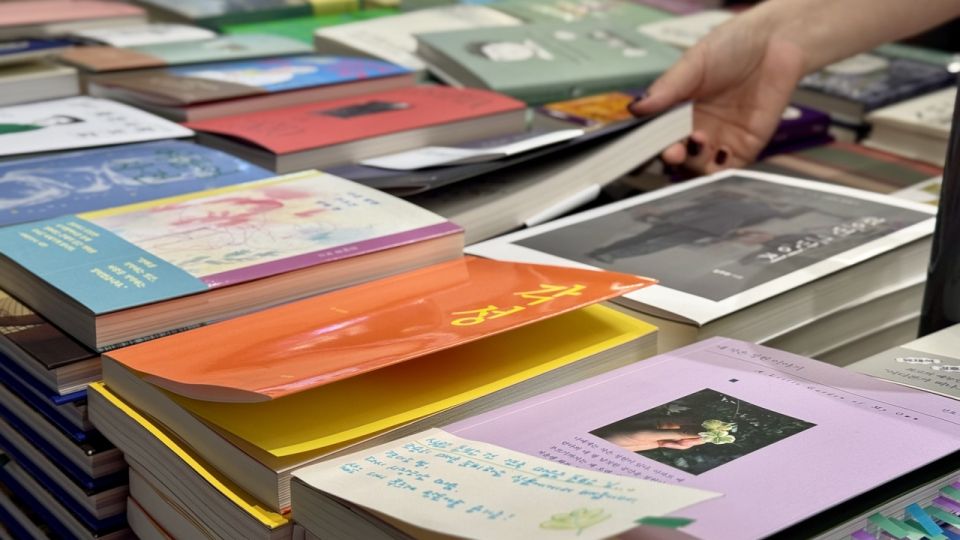September 23, 2025
SEOUL – When “I Want to Die but I Want to Eat Tteokbokki” appeared in 2018, it opened up something rare in Korean publishing. Part memoir, part therapeutic dialogue, the book was grounded in the author’s experience of clinical depression. Classified as a “Korean Essay” by local bookstores, it stood out because it offered a vulnerable personal narrative.
Seven years on, the same category looks very different. Bookstores across South Korea showcase row after row of pastel-colored volumes repeating variations of the same lines:
“You are enough just by existing.”
“Even standing still is moving forward.”
“Happiness lives in ordinary days.”
These are what the industry loosely calls “healing essays.” They are short, comprising brief paragraphs or fragments and designed for quick skimming. Unlike memoirs anchored in life experience, they function less as narratives and more as collections of quotable phrases.
And they sell.
In the monthly bestseller charts of Korea’s largest bookstore chains — Kyobo Book Center, Yes24 and Aladin — at least two or three of the top 10 titles are now these healing essays. According to Yes24’s annual report, more than 4,200 essay titles were released in 2023, almost double the figure a decade earlier. Unit sales in the “Korean Essay” category have grown by more than 30 percent since 2019, while other categories such as nonfiction and translated literature have stagnated.
“It’s the safest bet for publishers,” said a senior editor at a major local publishing house, speaking on condition of anonymity.
“You don’t need characters, research or story. What matters is whether a sentence looks good underlined with a highlighter. Marketing teams literally ask, ‘Can this be photographed for Instagram?’ That is the bar now.”
For readers, the appeal is rarely about literary quality. It is about what the act of buying the bound tome symbolizes.
“I don’t expect them to change my life,” said Ham, a 34-year-old pharmacist who has bought a few those essays. “I know the words are vague. But when I buy one, it feels like I gave myself permission to rest. Even if I only read a few pages, I own the gesture. That feels important.”

Bestseller shelves at Kyobo Book Center in Gwanghwamun, central Seoul, display the latest popular essay titles on Wednesday. PHOTO: THE KOREA HERALD
That gesture does matter in Korea, and buying a book still carries cultural legitimacy.
As sociologist Lee Jung-yeon of Seoul Women’s University explained, “Books remain objects of seriousness in Korea. So when people pay about 16,000 won ($11.50) for an essay book, they are not just buying sentences. They are buying the right to tell themselves: ‘I am caring for myself in a respectable way.’”
This helps explain why readers may not feel deceived even when they recognize a lack of substance. The trade is conscious. They know the pages contain platitudes, but the purchase itself — just expensive enough to feel weighty — delivers a socially sanctioned form of self-care.
Psychologists see both benefit and risk.
“When people are under extreme stress, they don’t necessarily want rigorous analysis,” said Lee Dong-gwi, a professor of clinical psychology at Yonsei University. “They want words that can be absorbed in one glance, almost like mantras. That can reduce a sense of isolation. But quick comfort should not be confused with genuine recovery. The danger is when people expect these lines to serve as therapy.”
Not all readers are forgiving.
“They’re like fast food for the mind,” said Yoon, a 26-year-old graduate student in European literature at Kyung Hee University. “Easy to swallow, instantly gratifying, marketed as nourishing even when they’re mostly empty calories. I don’t blame people for reaching for them, but I wonder what it means if this becomes our main diet.”
Publishers acknowledge this demand openly.
“It is the easiest genre to scale,” the anonymous editor added. “One influencer with 200,000 Instagram followers can be turned into an author in months. The book itself doesn’t need depth. Their audience supplies the market.”


